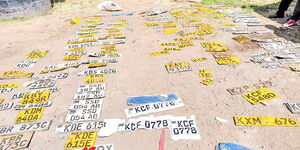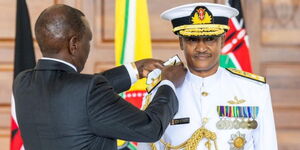The police have arrested two teenagers captured on video desecrating the Kenyan flag after a football match at Nairobi's Nyayo National Stadium.
Following the arrests, netizens have engaged in debates about what Kenya’s law says regarding the arrest and handling of minors.
The incident occurred on Saturday, September 20, during the Confederation of African Football (CAF) Champions League fixture between Somalia’s Mogadishu FC and Kenya Police FC.
Footage obtained by Kenyans.co.ke showed the boys, who were later revealed to be 17 and 14 years old, violating a Kenyan flag by stepping on it and doing other indecent acts on it.
The clips, which went viral, sparked a massive uproar from Kenyans, with some demanding the arrest of the culprits.
According to Kenyan law, any person who shows disrespect, in speech, manner or writing, to or with reference to the National Anthem, or to any specified emblem, specified likeness or specified name, or any representation thereof, shall be guilty of an offence.
Individuals found guilty of violating this act are liable to a fine that can lead to fines of up to Ksh5,000 and/or imprisonment for up to six months.
Following the incident, police arrested the two on Thursday, September 25, hours apart.
The arrests divided opinion on what the law allows for in the detainment of minors. Some questioned whether the teens would be held in police cells after their arrest, together with adults.
What the Law Says About Arrest of Minors
The Constitution of Kenya, through the Children Act, 2022, stipulates that children aged between 14 to 17 years can be held criminally liable for offences, but must be treated under the special provisions of the Act.
Children aged between 12 to 13 years are presumed to not be capable of differentiating right from wrong unless the court is satisfied otherwise. For children below 12 years cannot be held criminally responsible for any offence.
Regarding arrest, a police officer who arrests a child must notify the child’s parent/guardian and the Secretary of Child Services or authorised public officer, within 24 hours. A Children’s Officer must conduct a social inquiry report on the child’s circumstances and submit it to the police.
Further, Article 53(2) of the Kenyan Constitution requires that in every matter concerning a child, their best interests must be considered first. This means whenever authorities are dealing with a child, that principle shapes all decisions.
Detaining Minors
On detention, the law dictates that detention should only be used as a last resort. It encourages courts and police to use alternatives such as diversion, placement with family, or educational settings.
The aspect of diversion is encouraged to rehabilitate and reintegrate children without criminalising them. A child may be diverted if there is compelling evidence that they committed the offence, they voluntarily admit responsibility, or if a child is a first or second offender.
If a child is to be detained, it is for the shortest possible time, and the detention should take into account various factors such as the child’s health, age, disability and health needs.
Also, minors who are detained should not be kept together with adults, with the law directing that they be held in special facilities.
Aside from the aforementioned special provisions, arrested minors still enjoy rights accorded to arrested persons.
These include - right to fair hearing, right to an order of habeas corpus, right to legal representation, freedom from torture, cruel, inhuman or degrading treatment or punishment and freedom from slavery or servitude.












